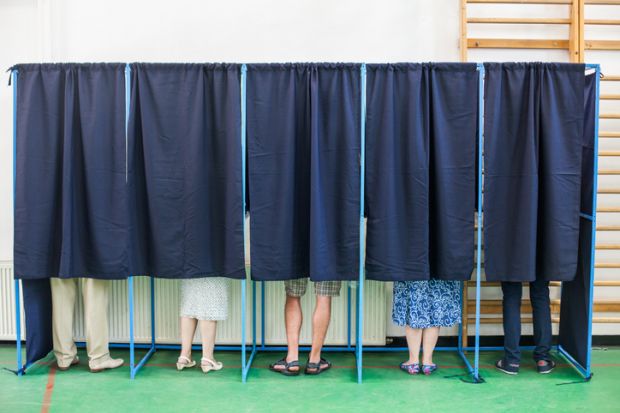Labour appears to have recovered the support from students in the UK that it lost in the latter period of Jeremy Corbyn’s leadership, according to a new survey on voting intentions.
According to the survey from the Higher Education Policy Institute, carried out by YouthSight last month, 62 per cent of students said they were highly likely to vote for Labour, up 24 percentage points on the same point last year.
Support for Labour appeared to almost halve among students in the 18 months leading up to August 2019, with its position on Brexit seen as a major factor.
The YouthSight data suggest that the party recovered some ground ahead of the December 2019 general election, won by the Conservatives, but has climbed further since Sir Keir Starmer became leader in April, a period dominated by upheaval in the sector because of the coronavirus pandemic. The latest survey was carried out between 13 and 18 August, in the midst of the A-level exam results fiasco.
However, the current Labour leader’s rating among students has yet to reach the heady heights of the peak in support for Mr Corbyn, which reached +35 per cent (the difference between the share saying they strongly liked or disliked the leader) in early 2018.
Sir Keir’s favourability rating among students is currently +16 per cent, and almost a third of students said that they had no opinion on his leadership. However, the rating is much higher than support for Mr Corbyn at the same point last year, when it was down to 1 per cent.
Rachel Hewitt, director of policy and advocacy at Hepi, said that the party voting intentions revealed by the latest survey “may be surprising to those who believed Corbynism was entrenched in university campuses”.
“While the next election is still a way off, if Starmer continues on this trajectory he can feel confident of support from this key target group for Labour.”
The Conservatives are the next most popular party among students, but support has plummeted to 12 per cent from a high of 21 per cent in April.
Boris Johnson’s favourability rating among students has grown since the same point last year, when he had just become prime minister, but is still the lowest of all the major party leaders at -43 per cent.
The other major UK-wide political parties achieve low levels of support in the latest survey among students highly likely to vote: the Green Party is at 9 per cent and the Liberal Democrats are at 8 per cent.
Ed Davey, who was only elected Liberal Democrat leader in August, had a similar favourability rating among students (-5 per cent) as the previous leader Jo Swinson (-6 per cent).
Meanwhile, the survey also shows that students in the UK appear to be more politicised than at any time in the last 16 years with more than four out of five saying they would be highly likely to vote if there was a general election tomorrow.
Ben Marks, chief executive at YouthSight, said that the figure, which has peaked at 84 per cent this year, was the highest it had been since the research agency started its student voting survey in 2004.
“Students have been politicised by Brexit, climate change, race issues and more. They feel their views are not being represented. I think we are looking at the making of a future activist generation,” he said.
The survey follows a report from Hepi last week on key university constituencies that suggested more students are voting for Labour and fewer for the Conservatives with every passing general election. Data from the latest survey back up this trend in 2020, with students still about 26 percentage points more likely than the general population to say they support Labour.
Register to continue
Why register?
- Registration is free and only takes a moment
- Once registered, you can read 3 articles a month
- Sign up for our newsletter
Subscribe
Or subscribe for unlimited access to:
- Unlimited access to news, views, insights & reviews
- Digital editions
- Digital access to THE’s university and college rankings analysis
Already registered or a current subscriber? Login





